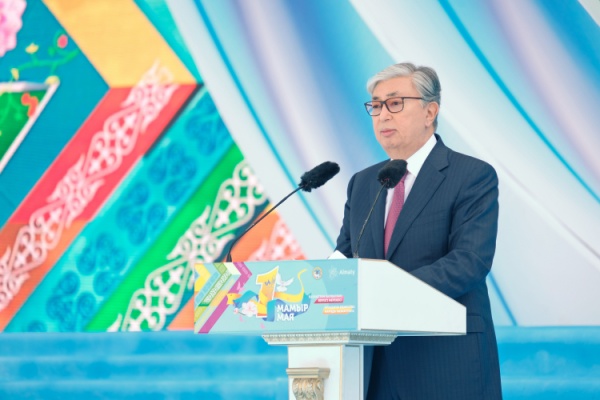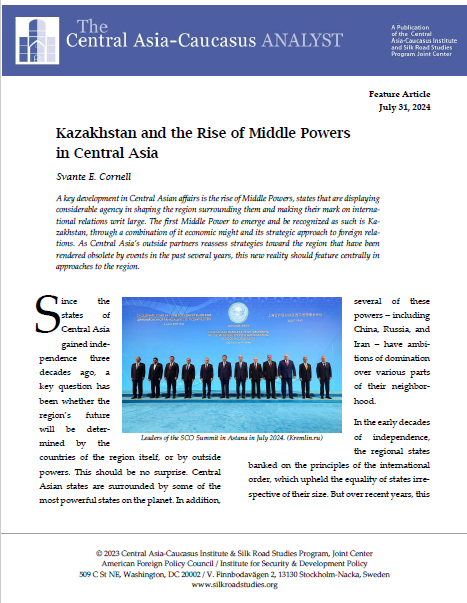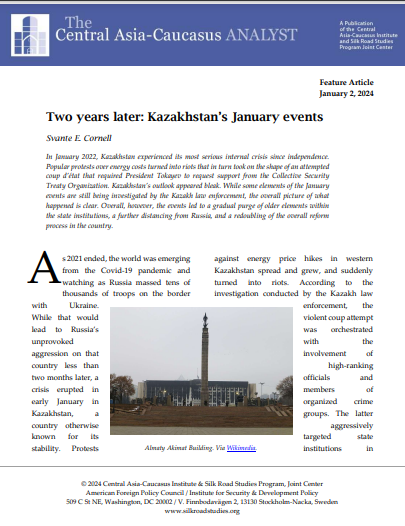Kazakhstan and the Rise of Middle Powers in Central Asia
Svante E. Cornell
July 31, 2024
A key development in Greater Central Asian affairs is the rise of Middle Powers, states that are displaying considerable agency in shaping the region surrounding them and making their mark on international relations writ large. The first Middle Power to emerge and be recognized as such is Kazakhstan, through a combination of it economic might and its strategic approach to foreign relations. As Central Asia’s outside partners reassess strategies toward the region that have been rendered obsolete by events in the past several years, this new reality should feature centrally in approaches to the region.
Kazakhstan Resurrects Golden Horde in Political Messaging
By Dmitry Shlapentokh
April 24, 2024
Recently, Kazakhstan’s President Kassym-Jomart Tokayev delivered a public address wherein he underscored the significance of the Golden Horde, also known as Ulus Jochi, to Kazakhstan. He emphasized that Kazakhstan stands as the true descendant of the Golden Horde, equating its historical importance to that of the Roman Empire. Tokayev emphasized the importance of ensuring international recognition of this fact. Additionally, he announced the commissioning of a comprehensive multi-volume history of Kazakhstan, with a dedicated volume specifically focusing on Ulus Jochi and its pivotal role in shaping Kazakhstan’s history. Tokayev’s recent revival of this ideology suggests that Kazakhstan, in stark contrast to Russia and implicitly other post-Soviet states, espouses principles of tolerance and peaceful coexistence.
Turkey-Kazakhstan Relations: A Strong Partnership in the Turkic World
Bayram Balcı
February 21, 2024
Kazakhstan has been a key partner for Turkey in the Turkic world, with relations that have been positive and expanding since independence. They have accelerated in recent years, with more institutionalized political relations, and ambition to further boost economic relations, and the continued role of Turkish soft power in Kazakhstan. In recent years, particularly after Turkey’s more active projection of military power abroad, military cooperation has also developed into an important element of Turkey-Kazakhstan relations.
Russian Influence in Turkmenistan: Rapprochement or Pragmatism?
Slavomir Horak
January 19, 2024
Turkmenistan underwent a serious rapprochement with Russia in recent years, particularly after the establishment of a ruling tandem with Serdar Berdimuhamedow as a formal president and his father, Gurbanguly Berdimuhamedow, who retained significant influence in Turkmenistan’s domestic and foreign policy. Due to a few viable alternatives, Russia represents the balancing factor for Turkmenistan towards the increasing Chinese influence over the country and the principal supporter of the regime. On the contrary, Turkmenistan remains a loyal partner in the region for Russia, where the most significant players (Kazakhstan and Uzbekistan) expressed their cautious approach towards Russia's advance in Ukraine.
Two Years Later: Kazakhstan's January Events
By Svante E. Cornell
January 2, 2024
In January 2022, Kazakhstan experienced its most serious internal crisis since independence. Popular protests over energy costs turned into riots that in turn took on the shape of an attempted coup d’état that required President Tokayev to request support from the Collective Security Treaty Organization. Kazakhstan’s outlook appeared bleak. While some elements of the January events are still being investigated by the Kazakh law enforcement, the overall picture of what happened is clear. Overall, however, the events led to a gradual purge of older elements within the state institutions, a further distancing from Russia, and a redoubling of the overall reform process in the country.






